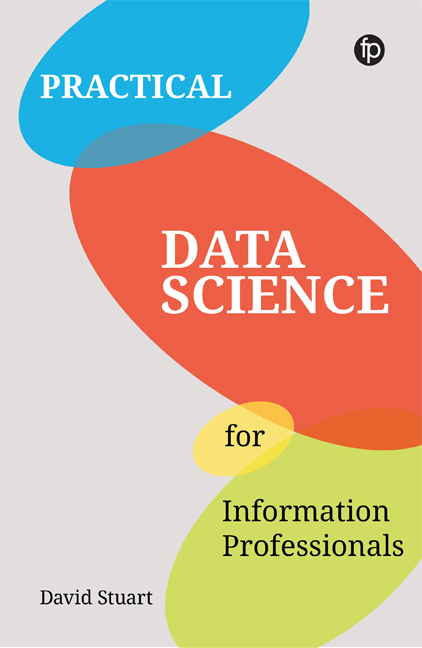Book contents
- Frontmatter
- Dedication
- Contents
- Figures
- Tables
- Boxes
- Preface
- 1 What is Data Science?
- 2 Little Data, Big Data
- 3 The Process of Data Science
- 4 Tools for Data Analysis
- 5 Clustering and Social Network Analysis
- 6 Predictions and Forecasts
- 7 Text Analysis and Mining
- 8 The Future of Data Science and Information Professionals
- References
- Appendix – Programming Concepts for Data Science
- Index
8 - The Future of Data Science and Information Professionals
Published online by Cambridge University Press: 14 August 2020
- Frontmatter
- Dedication
- Contents
- Figures
- Tables
- Boxes
- Preface
- 1 What is Data Science?
- 2 Little Data, Big Data
- 3 The Process of Data Science
- 4 Tools for Data Analysis
- 5 Clustering and Social Network Analysis
- 6 Predictions and Forecasts
- 7 Text Analysis and Mining
- 8 The Future of Data Science and Information Professionals
- References
- Appendix – Programming Concepts for Data Science
- Index
Summary
This final chapter considers the future growth of data science and the role of information professionals as they continue to reposition themselves in the changing information ecosystem. Short of a worldwide catastrophe, it is impossible to see anything but the continued rapid growth of data over the coming years. Whatever measure is used, data production and consumption is expected to rise. For example, the Computer Information System Company (Cisco) predicts that by 2022 there will be more internet traffic per year than there was between 1984 and 2016 (Cooney, 2018).
The way particular sets of data are able to be used will differ. With the introduction of the GDPR access to personal data is already restricted, but whether we are talking big data, little data or some as yet unheralded type of data – there will be more data and more data science.
This growth will be accompanied by many opportunities for data science in the sciences, arts and humanities, as well as in homes, offices, businesses and of course libraries. Data science work has been described as the ‘sexiest job of the 21st century’ (Davenport and Patil, 2012), and while that is a description that is rarely levelled at library and information professionals, this book should have helped to persuade readers that there are opportunities for library and information professionals to help others apply data science methods, and to use data science methodologies in their own work.
This chapter consists of three parts:
a list of eight challenges facing data science; although it is a field in the ascendency, associated with progress and all things modern, it is essential that we are aware of some of the challenges data science continues to face, and don't get caught up in the more extreme hyperbole of the hype cycle
a list of ten steps that would-be library and information science professionals might take when embarking on a career in data science librarianship; as has been frequently expressed throughout this book, a lot falls under the data science umbrella, and the practical first steps are all too easily overlooked
a short call to play; there is no book or course that can give more than the most basic of introductions to data science.
- Type
- Chapter
- Information
- Practical Data Science for Information Professionals , pp. 133 - 146Publisher: FacetPrint publication year: 2020

